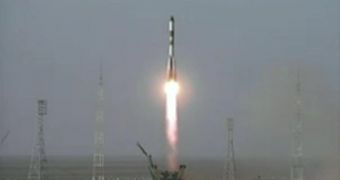According to the Russian Federal Space Agency (RosCosmos), the Progress 44 unmanned cargo spacecraft crashed yesterday, August 24, about 5 minutes after launch. Early reports indicate a malfunction was to blame for the engine shutdown that led to the mission abort.
The capsule was on its way to the International Space Station (ISS), delivering 3.5 tons of supplies for the 6-astronaut Expedition 28 crew. However, the loss of the Progress is not likely to affect operations aboard the orbital lab in any meaningful way.
NASA officials say that the Soyuz delivery system itself was responsible for the crash, which occurred shortly after a 9 am EDT (1300 GMT) launch from the Baikonur Cosmodrome, in Kazakhstan. The Progress was supposed to reach the station this Friday, after a two-day orbital chase.
Such incidents are highly unusual for RosCosmos, which has been launching manned Soyuz and unmanned Progress capsules successfully for decades. The last time when a Progress failed was more than ten years ago. The two designs are remarkably efficient and safe.
However, the new event comes as the second incident to affect the Russian space agency in a week. But officials at RosCosmos say that they will pick up the pieces, and launch a new Progress capsule with an identical payload as soon as possible.
“Unfortunately, about 325 seconds into flight, shortly after the third stage was ignited, the vehicle commanded an engine shutdown due to an engine anomaly. The vehicle impacted in the Altai region of the Russian Federation,” NASA station program manager Mike Suffredini said in a press briefing.
He added that all the cargo the capsule carried is 100 percent replaceable, and that there is no reason to believe that station operations will be hindered by the event. There are currently enough supplies on the ISS to allow astronauts to last for months without any incoming spacecraft.
“There were very few one-of-a-kind items – in fact, none that I'm aware of. Logistically, we're in very good shape,” Space quotes the NASA official as saying during the briefing, which was held yesterday.
At this point, even if the remaining two Progress capsules scheduled to launch this year fail as well, the ISS crew can still manage on existing supply until the European Space Agency's (ESA) Autonomous Transfer Vehicle (ATV) 3 launches to the station on March 5, 2012.
The next Soyuz launch is scheduled to take place on September 21, and it will deliver three new crewmembers to the station. NASA astronaut Ron Garan and cosmonauts Andrey Borisenko and Alexander Samokutyaev are scheduled to return home next month as well.

 14 DAY TRIAL //
14 DAY TRIAL //